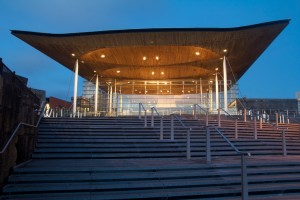Politics and Wales – a glimpse of sunshine
 I have been in Cardiff for the last three days, attending a workshop organised by the EU funded Politics project. Pontydysgu are a partner in the project which aims to use Web 2.0 and social software tools for people to learn about politics. Although the subject is great there are as ever problems. How can we get young (and not so young) people to communicate between different cultures and different languages. Some of the partners are schools or working in the school and vocational learning sectors. As such the teachers are using the politics resources and (under development) platform to scaffold learning for young people. Other partners, like Pontydysgu, wish to develop the platform and tools for self directed learning by young people. Is it possibel to develop resources, tools and an overall platform which can cater for such different approaches to learning. In some ways it is more difficult to develop the platform for self directed learning, as the resources and platform need to at least assist in scaffolding the learning. And despite progress in such areas as recommender systems and the provision for supporting peer based learning, I think our understanding of how to use technologies for scaffolding learning is still inits early stages.
I have been in Cardiff for the last three days, attending a workshop organised by the EU funded Politics project. Pontydysgu are a partner in the project which aims to use Web 2.0 and social software tools for people to learn about politics. Although the subject is great there are as ever problems. How can we get young (and not so young) people to communicate between different cultures and different languages. Some of the partners are schools or working in the school and vocational learning sectors. As such the teachers are using the politics resources and (under development) platform to scaffold learning for young people. Other partners, like Pontydysgu, wish to develop the platform and tools for self directed learning by young people. Is it possibel to develop resources, tools and an overall platform which can cater for such different approaches to learning. In some ways it is more difficult to develop the platform for self directed learning, as the resources and platform need to at least assist in scaffolding the learning. And despite progress in such areas as recommender systems and the provision for supporting peer based learning, I think our understanding of how to use technologies for scaffolding learning is still inits early stages.
Anyway, and changing the subject, yesterday morning we moved the workshop to the Wales Assembly, where we met our Regional assembly Member, Leanne Wood and went for a tour of the Assembly. It was a surprisingly good experience in allowing an international group of project partners to relate the work we are doing on education to the broader field of politics as a whole. And I was impressed by the Assembly building. None of that old fashioned privilege and tradition associated with Westminster. Instead it is a modern, energy efficient building (no need for artificial lighting and heated through geo-thermal energy), based on the idea of transparency. Young people were wandering around, interviewing the First Minister for a BBC programme. The sun may have helped to provide a feeling of hope, starkly contrasting to the gloom an despair t5ha Westminster politic engenders today.
Anyway that was the first three days of this week. If you were at the meeting, please feel free to add your comments on what you thought about our work together and the visit to the Wales Assembly.
